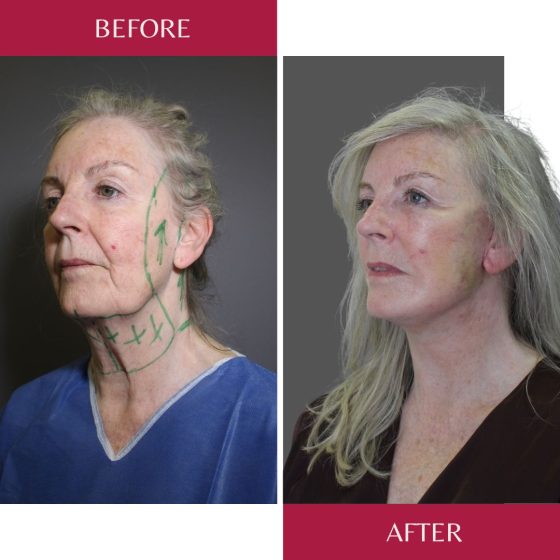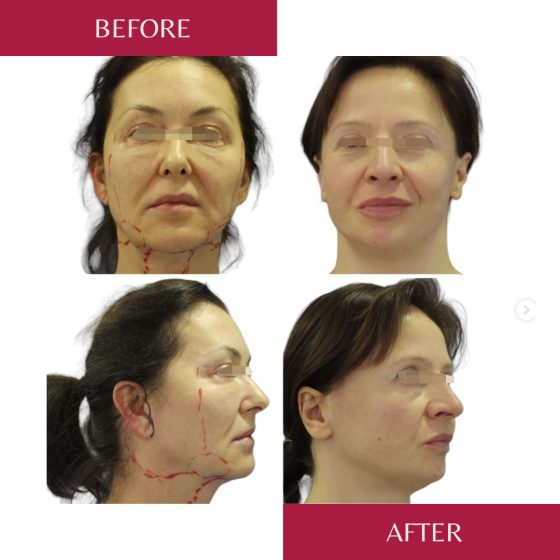Procedure in numbers
Other plastic surgeries
You could be interested in…
All about procedure
Rhytidectomy, or the ‘facelift,’ is often associated with Hollywood celebrities as one of their primary means for getting rid of wrinkles and sagging skin to retain a youthful visage. But you don’t have to be a star to reap its benefits nor have a Hollywood-sized income to afford one.
The face and neck lift surgery is an operation aimed at raising the layers to improve the face oval shape and neck muscle plasticity along with the reduction of flabby skin.
With age, the skin and muscles of the face area become flaccid and saggy. The face and neck lifting surgery will lift deeper facial structures, remove excess skin or fat tissue. The face and neck lift surgery can be performed as a single procedure or in combination with other procedures such as eyebrow lift surgery, liposuction, eyelid correction, fat transfer to cheeks individually adjusted for each patient. The best candidates for face and neck lifting surgery are patients with flexible skin and enhanced bone structures. As a result of face and neck lifting surgery, it is not possible to completely remove deep furrows and wrinkles, which may require complementary procedures (laser resurfacing, chemical peels, dermabrasion).When done well, this results in a firmer, younger-looking appearance for many years.
WHO SHOULD THINK ABOUT A FACELIFT
The best candidates for undergoing the procedure are patients who have significant sagging, loss of muscle tone, loose skin and also excess of fat tissue in the area of midface, jowls and/or neck.
Good test results and good health are also important when qualifying for surgery. Therefore, before the planned procedure, the necessary blood tests are performed:
- morphology,
- blood coagulation factors (APTT / INR),
- creatinine,
- electrolyte levels (Na-sodium, K-potassium),
- blood group (standard for procedures under general anesthesia).
An anesthesiological interview is conducted immediately before the procedure and an interview with an anesthesiologist during which the patient can learn all aspects of general anesthesia. About two weeks before surgery, smoking should be stopped – it has a significant impact on the wound healing process. You should also avoid taking medicines that thin the blood, e.g. aspirin. On the day of the operation, do not eat or drink beverages (including water) for a minimum of 6 hours before surgery.
THE COURSE OF FACELIFT SURGERY
The surgery is provided under general anaesthesia and requires 1 day of stay in the clinic under medical care. The patient can return to their country after 4-5 days, but we recommend to stay 7 days until we remove the stitches from the posterior side of earlobe auricles. The skin is being cut above the auricle, within the hairy skin of the temple, then down in front of the ear and behind the auricle up, then transverse to the scalp of occiput. Later the skin is being released of the entire cheek and depending on the conditions, also of the neck. By the parotid gland the buccal fascia is being shorten, which results in cheek rejuvenation. On the neck the wide muscle of the neck is being pulled tight, which reduces the neck wrinkles. At the end of the procedure the excess of skin is being removed through cutting off, which results in additional alignment of the face. Also drains are installed in order to control the bleeding. The results are permanent.
How to prepare myself to the surgery?
Preparation for the surgery is connected with providing us with information about your health condition, taken medicines and any previously underwent surgeries. According to such information we can advise to perform additional examinations. In case of smokers, please limit smoking few weeks before the surgery and then during recovery. During two weeks before the surgery patients should not take any aspirin or paracethamol pills, also garlic, Omega3 and vitamine E is not allowed. It is advised to take arnica (a herb) few weeks before and few weeks after the surgery. In case of women: having period on the day of the surgery is not allowed. If the surgery is going to be performed in general anaesthetic please be on empty stomach from the very morning on the day of the surgery (no drinks and food).
FACELIFT CANDIDATES
You may be a good candidate for cosmetic surgery if you’re healthy, have reasonable expectations, and know the risks of the procedure you’re considering. You may not be a good candidate for a facelift and other cosmetic surgeries if you have serious health problems such as diabetes, high blood pressure, bleeding disorder or depression. If you’re obese or you smoke or drink too much alcohol, you may not be a good candidate for cosmetic surgery too.
You will be asked to make some changes before surgery. For instance, smokers should quit smoking for two to four weeks before surgery and not smoke for at least four weeks after surgery. This allows the body to heal properly from the surgery. If you don’t smoke, you should avoid secondhand smoke before and after surgery.
PREPARING FOR THE TREATMENT
METHODOLOGY OF THE TREATMENT
POST-OPERATIVE RECOMMENDATIONS
POSSIBLE COMPLICATIONS
CONTRAINDICATIONS FOR THE TREATMENT
PRICES
DOCUMENTS
PREPARING FOR THE TREATMENT
Surgery must not be given to patients who are obese, take anabolic drugs, or abuse alcohol. Good test results and good health are also important when qualifying for surgery. Therefore, before the planned procedure, the necessary blood tests are performed:
- morphology,
- blood coagulation factors (APTT / INR),
- creatinine,
- electrolyte levels (Na-sodium, K-potassium),
- blood group (standard for procedures under general anesthesia).
- SR (sedimentation rate),
- HBs,
- HCV ○ serum glucose,
- EKG (only for patients older than 55 y.o.),
An anesthesiological interview is conducted immediately before the procedure and an interview with an anesthesiologist during which the patient can learn all aspects of general anesthesia. About two weeks before surgery, smoking should be stopped – it has a significant impact on the wound healing process. You should also avoid taking medicines that thin the blood, e.g. aspirin. On the day of the operation, do not eat or drink beverages (including water) for a minimum of 6 hours before surgery.
METHODOLOGY OF THE TREATMENT
The surgery is provided under general anaesthesia and requires 1 day of stay in the clinic under medical care. The patient can return to their country after 4-5 days, but we recommend to stay 7 days until we remove the stitches from the posterior side of earlobe auricles. The skin is being cut above the auricle, within the hairy skin of the temple, then down in front of the ear and behind the auricle up, then transverse to the scalp of occiput. Later the skin is being released of the entire cheek and depending on the conditions, also of the neck. By the parotid gland the buccal fascia is being shorten, which results in cheek rejuvenation. On the neck the wide muscle of the neck is being pulled tight, which reduces the neck wrinkles. At the end of the procedure the excess of skin is being removed through cutting off, which results in additional alignment of the face. Also drains are installed in order to control the bleeding. The results are permanent.
POST-OPERATIVE RECOMMENDATIONS
Surgical correction of face and neck structures is an invasive procedure. Immediately after the procedure, the patient may experience such ailments like swelling. There may also be signs of a physiological response to the surgery, such as swelling around the eyes, bruising and hematomas around the face, including the cheeks and neck. The final effect of the procedure appears a few months after the surgery and is determined by an individual healing process. It is important to follow the doctor’s instructions during recovery:
- changing of the dressing in every second day
- treatment with antibiotics to avoid infection
- stitches removal after 7 and 10 days from the operation
- ointment to liquor the scarfs should be used for 3 weeks
- You should avoid high temperatures for 6 months
- during the first 3 months from surgery sun-bathing, solarium and sauna are forbidden
- 3 weeks after surgery scarfs should be greased with Dermatix ointment (twice a day);
- for 3 weeks from your surgery every (even simple) activity, that requires physical effort like cleaning, vacuuming or washing is forbidden;
- for 6 weeks from surgery you cannot practise any sport that requires physical effort like aerobics, fitness, swimming etc.
POSSIBLE COMPLICATIONS
MODERN SURGERY IS GENERALLY SAFE BUT DOES HAVE THE POTENTIAL FOR RISKS AND COMPLICATIONS TO OCCUR.
SOME GENERAL RISKS AND COMPLICATIONS OF SURGERY MAY INCLUDE:
- bleeding from an operated site
- allergic reaction to sutures, dressings or antiseptic solutions
- formation of blood clot (haematoma) beneath an incision site that may require drainage
- bruising and swelling around the operated site(s)
- keloids and hypertrophic scars that are raised, red and thickened scars that may form over the healed incisions. These may be itchy, annoying and unsightly but are not a threat to health
- slow healing, often related to smoking or diabetes
- separation of wound edges, often related to not proper scar treatment after surgery
CONTRAINDICATIONS FOR THE TREATMENT
- poor blood test results
- coagulation disorders
- unregulated blood pressure
- unregulated diabetes
- purulent skin infections
- body infections




